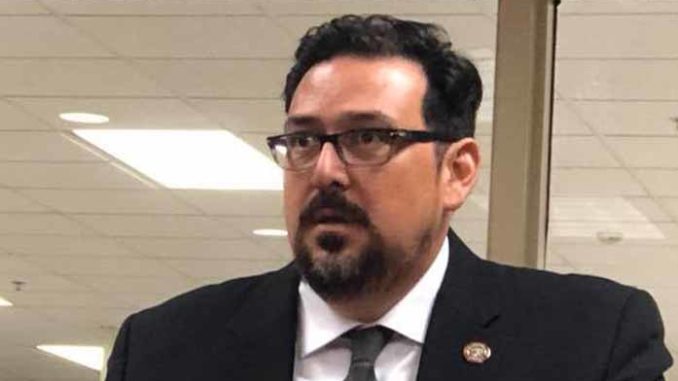
by Jonathan Eberle | Aug 9, 2025 | News
By Jonathan Eberle |
Arizona Public Service (APS), the state’s largest electric utility, announced Wednesday it will no longer pursue its previous pledge to achieve zero carbon emissions by 2050. The company also scrapped its interim emission reduction targets and removed a commitment to end coal-fired generation by 2031 from its website. The utility now aims to be “carbon neutral” by 2050 — a less stringent target that allows for continued fossil fuel use if emissions are offset through technology such as carbon capture.
“Our aspiration has evolved based on changes to energy markets and customer needs, and our plans are built around doing what’s right for the people and prosperity of Arizona,” said APS spokeswoman Jill Hanks in a statement to 12News.
The announcement quickly drew sharp criticism from environmental advocates, who accused the company of backing away from its public commitments. “APS is walking away from every clean energy promise it made to the public, to regulators, to shareholders, and to the communities it serves,” said Autumn Johnson, Executive Director of the Arizona Solar Energy Industries Association. “We are left with vague intentions and zero accountability.”
A free-market advocacy group also voiced concerns, though from a different perspective. The Arizona Free Enterprise Club argued that the new plan still comes with a heavy cost to consumers. “While this is modestly better than the carbon-free plan they have been pushing for the last five years, APS’ new ‘carbon neutral’ plan will still cost ratepayers billions,” said Scot Mussi, the group’s president. “The priority should be reliable and affordable baseload power for Arizonans, not meeting arbitrary carbon goals that require massive amounts of expensive wind and solar that will degrade the grid.”
Some of Arizona’s elected officials also weighed in. Arizona Governor Katie Hobbs criticized the decision on X, writing, “Arizona needs an abundance of energy, with a strong, and reliable grid to keep our communities safe and to continue our economic growth. This decision sets us back. It makes our air dirtier, hurts our growing clean energy economy, and forfeits the cost savings of renewable options.”
She continued, “I’ll be reaching out to APS to discuss their decision and reiterate that we must continue investing in new energy technologies and diversify our energy portfolio at the fastest rate possible.”
Hobbs’ response is interesting given her history with APS. After her inauguration, it was revealed that Pinnacle West Capital Corp., the owner of APS, donated $250,000 to Hobbs’ inaugural fund. The group also made a $100,000 donation in 2024 to Hobbs’ secret litigation fund.
Republican gubernatorial candidate, and sitting U.S. Representative, Andy Biggs offered a sharply different take than Hobbs, posting, “Every utility in our state should be prioritizing reliable and affordable energy for Arizonans, not trying to meet the demands of environmentalists pushing the Green New Scam that hurts Arizona businesses and families. As Governor, I’ll make sure Arizona aligns with President Trump’s energy agenda to help our economy flourish.”
APS data shows most of the state’s surging energy demand is coming from the expansion of data centers rather than residential growth. The company and its investors view the sector as a major opportunity for revenue.
While APS maintains it remains committed to expanding cost-competitive clean energy, the rollback represents a significant departure from the 2020 pledge.
Jonathan Eberle is a reporter for AZ Free News. You can send him news tips using this link.

by Jonathan Eberle | Aug 8, 2025 | Education, News
By Jonathan Eberle |
As schools across Arizona reopen for the fall semester, State Superintendent of Public Instruction Tom Horne is encouraging parents to be alert to classroom content they believe may conflict with their family’s values. His call follows a recent U.S. Supreme Court ruling affirming parents’ rights to withdraw their children from classes that conflict with their religious beliefs.
“The U.S. Supreme Court recently ruled that parents have the Constitutionally protected right to opt their children out of classes when their religious beliefs conflict with course material,” Horne said in a public statement. “As the new school year begins, I am urging parents to be aware they have the power to ensure their child’s school is concentrating on academics, not social indoctrination.”
Horne cited a case from earlier this year involving a Tucson-area teacher whose lessons, he claimed, undermined students’ religious beliefs and promoted gender ideology. According to Horne, the teacher has since retired, and the matter was resolved. “This is exactly the type of situation that was addressed in this recent Supreme Court decision,” he said.
To address concerns like these, the Arizona Department of Education operates an “Empower Hotline,” which allows parents, educators, and citizens to report what they view as inappropriate content in the classroom. Horne said the hotline has received complaints about lessons that focus on race, gender identity, or content perceived as deviating from traditional academic instruction.
“Students need education in reading, writing, math, science, history, and the arts,” Horne added. “The inappropriate lessons about which parents are complaining are a distraction from these crucial academic subjects. My principal goal has been to bring back academic focus into the classrooms.”
The Supreme Court decision referenced by Horne affirms long-standing interpretations of parental rights in education but has gained renewed attention amid ongoing debates over curriculum content in public schools across the country.
Jonathan Eberle is a reporter for AZ Free News. You can send him news tips using this link.

by Jonathan Eberle | Aug 7, 2025 | News
By Jonathan Eberle |
The Arizona Court of Appeals is set to hear oral arguments on August 19 in a closely watched lawsuit challenging the state’s early ballot signature verification process—one that could reshape how election officials authenticate mail-in ballots. The case, Arizona Free Enterprise Club v. Fontes, will be heard by Division Two of the Court of Appeals, which lifted a prior stay in the case following a joint request by all parties to move forward on the merits.
At the heart of the dispute is whether the Secretary of State’s Elections Procedures Manual (EPM) has unlawfully expanded the scope of documents used to verify a voter’s signature on early ballot envelopes. The plaintiffs—Arizona Free Enterprise Club, Restoring Integrity and Trust in Elections, and Yavapai County voter Dwight Kadar—argue that Secretary of State Adrian Fontes and his predecessor, now-Governor Katie Hobbs, enforced EPM guidance that violates state law.
Under Arizona statute A.R.S. § 16-550(A), election officials are required to compare a voter’s early ballot envelope signature to the one in their “registration record.” However, the current EPM—originally authored by Hobbs in 2019 and maintained under Fontes—permits election officials to validate signatures by comparing them to any election-related document on file, such as early ballot requests, provisional ballot envelopes, or Active Early Voting List notices.
“The current election procedures manual adopted by the Secretary of State has rewritten state law regarding signature verification for mail-in ballots,” said Arizona Free Enterprise Club President Scot Mussi. “The result is a process that invites questionable methods and opportunities for abuse during the signature review process. It’s time for the courts to bring this illegal EPM practice to a halt.”
The case has had a turbulent procedural history. In 2023, Yavapai County Superior Court Judge John Napper initially ruled that the EPM violated state law, stating that the definition of “registration record” is neither vague nor ambiguous. Napper rejected the Secretary of State’s argument that the term could include any number of election-related documents. However, in a surprising reversal later in the proceedings, Napper ruled in favor of the state—prompting the plaintiffs to appeal.
The outcome of this case could have major consequences for how Arizona handles the verification of early ballots in future elections. Arizona is a state with widespread early and mail-in voting, and signature matching is often the sole method for confirming voter identity on ballots returned by mail. Early ballot voters are not required to provide other identifying information, such as a driver’s license number, date of birth, or the last four digits of a Social Security number.
After months of delays—including a stay prompted by a separate ruling that invalidated the 2023 EPM for procedural reasons—the Court of Appeals has agreed to resume the case. All parties have urged the court to issue a ruling on the merits, regardless of the Arizona Supreme Court’s handling of a related challenge filed by the Republican National Committee.
The court’s decision will help clarify the balance of power between Arizona’s elected officials and its election laws, especially in the increasingly scrutinized area of early voting.
Jonathan Eberle is a reporter for AZ Free News. You can send him news tips using this link.

by Jonathan Eberle | Aug 4, 2025 | News
By Jonathan Eberle |
The Arizona State Treasurer’s Office announced a major financial milestone last week: the Local Government Investment Pool (LGIP) has reached a record $7.6 billion in total assets. According to State Treasurer Kimberly Yee, the fund has grown by $4.3 billion — a 131% increase — since she took office in 2019.
The announcement came during the July State Board of Investment meeting, where Treasurer Yee presented the latest performance report. The LGIP, a fixed-income investment pool managed by the Treasurer’s Office, serves as a centralized option for local governments — including cities, counties, towns, and special districts — to invest public funds with an emphasis on safety and competitive yields.
The report shows that assets under management are up 7.08% year-over-year, with June earnings totaling more than $27.4 million, a 3.18% increase compared to the same month last year.
“We are proud to provide responsible stewardship of public funds while ensuring liquidity, safety, and strong returns,” Treasurer Yee said at the meeting.
Yee’s career in public service spans more than a decade, including eight years in the Arizona Legislature, where she served as Senate Majority Leader. Since assuming leadership of the Treasurer’s Office, Yee has emphasized transparency, performance, and accessibility. Under her watch, the state has expanded participation in the LGIP, which provides local government entities a low-risk, professionally managed option for investing taxpayer dollars.
The Office operates four separate LGIP pools, each tailored to meet the liquidity and investment needs of its contributors. By pooling resources, smaller jurisdictions gain access to economies of scale and greater portfolio diversification.
Jonathan Eberle is a reporter for AZ Free News. You can send him news tips using this link.

by Jonathan Eberle | Aug 3, 2025 | Economy, News
By Jonathan Eberle |
As Arizona counties finalize their budgets for Fiscal Year 2026, the majority are preparing to raise property taxes, with 11 of the state’s 15 counties proposing increases totaling nearly $54.8 million, according to the Arizona Tax Research Association’s (ATRA) July 2025 newsletter. The moves come amid population growth, infrastructure demands, and rising costs, but they have also triggered requirements under Arizona’s Truth in Taxation (TNT) law aimed at ensuring transparency.
ATRA’s analysis reveals that under state law, primary property taxes — which fund the general operations of county governments — are subject to TNT provisions. These rules require counties to notify taxpayers if their proposed tax levy exceeds the previous year’s amount, excluding new construction. Notifications must be published in newspapers of general circulation, and a public hearing must be held before any vote to approve the increase.
TNT also applies to some countywide special taxing districts, including those for libraries, flood control, and public health. While counties are allowed to raise taxes up to a constitutional limit — 2% above the previous year’s levy, plus new construction — only Apache and Coconino counties currently tax at that maximum level.
According to ATRA, of the counties planning tax hikes, Pima County stands out with the largest proposed increase: $33 million. This includes a nearly 25-cent hike in the primary property tax rate above TNT limits. Pima is also planning to exceed TNT thresholds for both its flood control and library districts.
Maricopa County, Arizona’s most populous, is proposing its first primary property tax increase in five years — not by changing the rate, but by holding it steady. Due to growth in the tax base, this would still result in a $12.5 million increase, exclusive of new construction.
In Coconino County, library district taxes are slated to rise 11.5% over TNT, generating approximately $780,000 in additional revenue. The county also plans to levy the maximum amounts for its primary property tax, as well as for its flood control and public health districts. Altogether, Coconino’s tax increase would total around $1.8 million.
Mohave County is eyeing a 7% increase in primary property taxes, which would raise about $3.2 million. Four counties — Graham, Greenlee, La Paz, and Pinal — have opted not to increase property taxes this fiscal year, bucking the statewide trend.
County officials say the proposed increases are necessary to sustain essential public services amid rising costs and growing populations. Still, the hikes are expected to generate scrutiny from taxpayers, especially in counties proposing large percentage increases or exceeding TNT thresholds.
Jonathan Eberle is a reporter for AZ Free News. You can send him news tips using this link.





